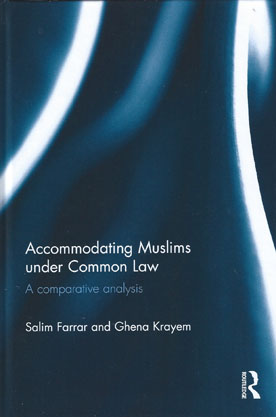We are now closed for the Christmas and New Year period, returning on Monday 5th January 2026. Orders placed during this time will be processed upon our return on 5th January.

The book explores the relationship between the Common Law and Shari’ah in both a historical and modern context.
The book looks at the accommodation of Shari’ah Law within Common Law legal traditions and the role of the judiciary in drawing boundaries for secular democratic states with Muslim populations who want resolutions to conflicts that comply with the dictates of their faith whether through judicial oversight of private ordering of disputes such as faith based arbitration or the regulation of the public domain such as the criminal law.
Salim Farrar and Ghena Krayem consider the question of recognition of Shari’ah by looking at how the flexibilities that exists in both the Common law and Shari’ah provide unexplored avenues for navigation and accommodation.
The issue is explored in a comparative context across several jurisdictions and case law is examined from selected jurisdictions with significant Muslim minority populations including: Australia, Canada, England and Wales, Singapore and the United States. The book examines how Muslims have framed their own claims for recognition and how Common Law judiciaries have responded within their constitutional and statutory confines and also within the contemporary contexts of demands for equality and universal human rights.
Acknowledging the inherent pragmatism of the Common Law and its history of adapting to changing societal circumstances and conditions the book demonstrates that the controversial issue of accommodation of Shari’ah is not necessarily one that requires the establishment of a separate and parallel legal system.